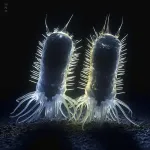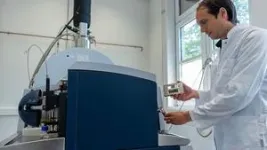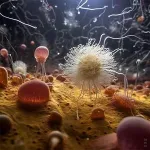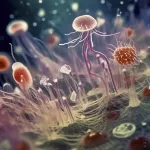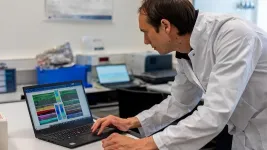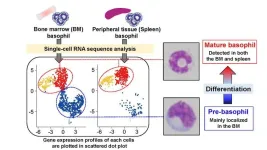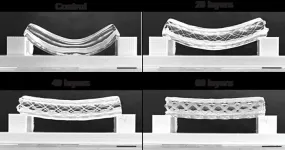(Press-News.org) The discovery of a “lost world” of ancient organisms that lived in Earth’s waterways at least 1.6 billion years ago could change our understanding of our earliest ancestors.
Known as the ‘Protosterol Biota’, these microscopic creatures are part of a family of organisms called eukaryotes. Eukaryotes have a complex cell structure that includes mitochondria, known as the “powerhouse” of the cell, and a nucleus that acts as the “control and information centre”.
Modern forms of eukaryotes that inhabit Earth today include fungi, plants, animals and single-celled organisms such as amoebae. Humans and all other nucleated creatures can trace their ancestral lineage back to the Last Eukaryotic Common Ancestor (LECA). LECA lived more than 1.2 billion years ago.
The discovery of the Protosterol Biota, published in Nature, was made by researchers from The Australian National University (ANU). According to the researchers, these organisms could have been the first predators on Earth.
These ancient creatures were abundant in marine ecosystems across the world and probably shaped ecosystems for much of Earth’s history. The researchers say the Protosterol Biota lived at least one billion years before any animal or plant emerged.
“Molecular remains of the Protosterol Biota detected in 1.6-billion-year-old rocks appear to be the oldest remnants of our own lineage – they lived even before LECA. These ancient creatures were abundant in marine ecosystems across the world and probably shaped ecosystems for much of Earth’s history,” Dr Benjamin Nettersheim, who completed his PhD at ANU and is now based at the University of Bremen in Germany, said.
“Modern forms of eukaryotes are so powerful and dominant today that researchers thought they should have conquered the ancient oceans on Earth more than a billion years ago.
“Scientists have long searched for fossilised evidence of these early eukaryotes, but their physical remains are extremely scarce. Earth’s ancient oceans rather appeared to be largely a bacterial broth.
“One of the greatest puzzles of early evolution scientists have been trying to answer is: why didn’t our highly capable eukaryotic ancestors come to dominate the world’s ancient waterways? Where were they hiding?
“Our study flips this theory on its head. We show that the Protosterol Biota were hiding in plain sight and were in fact abundant in the world’s ancient oceans and lakes all along. Scientists just didn’t know how to look for them – until now.”
Professor Jochen Brocks from ANU, who made the discovery with Dr Nettersheim, said the Protosterol Biota were certainly more complex than bacteria and presumably larger, although it’s unknown what they looked like.
“We believe they may have been the first predators on Earth, hunting and devouring bacteria,” Professor Brocks said.
According to Professor Brocks, these creatures thrived from about 1.6 billion years ago up until about 800 million years ago.
The end of this period in Earth’s evolutionary timeline is known as the ‘Tonian Transformation’, when more advanced nucleated organisms, such as fungi and algae, started to flourish. But exactly when the Protosterol Biota went extinct is unknown.
“The Tonian Transformation is one of the most profound ecological turning points in our planet’s history,” Professor Brocks said.
“Just as the dinosaurs had to go extinct so that our mammal ancestors could become large and abundant, perhaps the Protosterol Biota had to disappear a billion years earlier to make space for modern eukaryotes.”
To make the discovery, the researchers studied fossil fat molecules found inside a 1.6-billion-year-old rock that had formed at the bottom of the ocean near what is now Australia’s Northern Territory. The molecules possessed a primordial chemical structure that hinted at the existence of early complex creatures that evolved before LECA and had since gone extinct.
“Without these molecules, we would never have known that the Protosterol Biota existed. Early oceans largely appeared to be a bacterial world, but our new discovery shows that this probably wasn’t the case,” Dr Nettersheim said.
Professor Brocks said: “Scientists had overlooked these molecules for four decades because they do not conform to typical molecular search images.”
“But once we knew what we were looking for, we discovered that dozens of other rocks, taken from billion-year-old waterways across the world, were also oozing with similar fossil molecules.”
Dr Nettersheim completed the analysis as part of his PhD at ANU before accepting a position at the University of Bremen. This work involved scientists from Australia, France, Germany and the United States.
END
Scientists discover ‘lost world’ of early ancestors in billion-year-old rocks
2023-06-07
ELSE PRESS RELEASES FROM THIS DATE:
Remains of an extinct world of organisms discovered
2023-06-07
Newly discovered biomarker signatures point to a whole range of previously unknown organisms that dominated complex life on Earth about a billion years ago. They differed from complex eukaryotic life as we know it, such as animals, plants and algae in their cell structure and likely metabolism, which was adapted to a world that had far less oxygen in the atmosphere than today. An international team of researchers, including GFZ geochemist Christian Hallmann, now reports on this breakthrough for the field of evolutionary geobiology in the journal Nature.
The previously unknown “protosteroids” were ...
Scientists discover ‘lost world’ of our early ancestors in billion-year-old rocks
2023-06-07
The newly discovered record of so-called protosteroids was shown to be surprisingly abundant throughout Earth´s Middle Ages. The primordial molecules were produced at an earlier stage of eukaryotic complexity – extending the current record of fossil steroids beyond 800 and up to 1600 million years ago. Eukaryotes is the term for a kingdom of life including all animals, plants and algae and set apart from bacteria by having a complex cell structure that includes a nucleus, as well as a more complex molecular machinery. “The highlight of ...
ChatGPT designs its first robot with TU Delft researchers
2023-06-07
Poems, essays and even books – is there anything the open AI platform ChatGPT can’t handle? These new AI developments have inspired researchers at TU Delft and the Swiss technical university EPFL to dig a little deeper: For instance, can ChatGPT also design a robot? And is this a good thing for the design process, or are there risks? The researchers published their findings in Nature Machine Intelligence.
What are the greatest future challenges for humanity? This was the first question that Cosimo Della Santina, assistant professor, and PhD student Francesco Stella, both from TU Delft, and Josie Hughes from EPFL, asked ...
New study could help unlock ‘game-changing’ batteries for electric vehicles and aviation
2023-06-07
Study led by University of Oxford researchers has revealed the mechanisms that cause lithium metal solid-state batteries to fail.
Researchers used a high-resolution imaging method to visualize batteries in unprecedented detail during charging.
The new insights could help overcome the technical issues with solid-state batteries, unlocking a game-changing technology for electric vehicles and aviation.
Significantly improved electric vehicle (EV) batteries could be a step closer thanks to a new study led by University of Oxford researchers, published today in Nature. ...
New study identifies mechanism driving the sun’s fast wind
2023-06-07
The fastest winds ever recorded on Earth reached more than 200 miles per hour, but even those gusts pale in comparison to the sun’s wind.
In a paper published June 7, 2023 in the journal Nature, a team of researchers used data from NASA’s Parker Solar Probe to explain how the solar wind is capable of surpassing speeds of 1 million miles per hour. They discovered that the energy released from the magnetic field near the sun’s surface is powerful enough to drive the fast solar wind, which is made up of ...
Pre-basophils: A basophil origin story
2023-06-07
Researchers from Tokyo Medical and Dental University (TMDU) find that pre-basophil and mast cell progenitors differentiate into pre-basophils before producing mature basophils in mice
Tokyo, Japan – Big changes often happen in small steps, and it’s not always easy to see how we get from point A to point B. Now, researchers from Japan have found a new step in the process of cell differentiation that leads to the production of fully functional basophils, which are critical cells in the immune system.
In a study published this month in Nature Communications, researchers from Tokyo Medical and Dental University (TMDU) have revealed a previously unknown intermediate ...
Study uncovers role of ultraviolet radiation in development of rare leukemia in the skin
2023-06-07
BOSTON – A change of scenery can restore one's outlook, but for some precancerous cells, a journey from the caves of the bone marrow to the sunny climes of the skin can trigger genetic changes that are a harbinger of cancer, according to a new study by researchers at Dana-Farber Cancer Institute, Brigham and Women's Hospital, and the Broad Institute of MIT and Harvard.
The study, published online today by the journal Nature, is one of the first to uncover the "genetic travelogue" ...
Evaluating AI responses to public health questions
2023-06-07
About The Study: This analysis of the quality of responses to public health questions found that ChatGPT consistently provided evidence-based answers, although it primarily offered advice rather than referrals. Given the same addiction questions, Amazon Alexa, Apple Siri, Google Assistant, Microsoft’s Cortana, and Samsung’s Bixby collectively recognized 5% of the questions and made one referral, compared with 91% recognition and two referrals with ChatGPT.
Authors: John W. Ayers, Ph.D., M.A., of the University of California San Diego in La Jolla, is the corresponding author.
To ...
NCCN releases statement addressing ongoing chemotherapy shortages; Shares survey results finding more than 90% of cancer centers are impacted
2023-06-07
PLYMOUTH MEETING, PA [June 7, 2023] — The National Comprehensive Cancer Network® (NCCN®)—an alliance of leading academic cancer centers—published survey results today that shed light on just how widespread the current platinum chemotherapy shortage is, and shared a statement calling on the whole oncology community to work together on solutions.
“This is an unacceptable situation. We are hearing from oncologists and pharmacists across the country who have to scramble to find appropriate alternatives for treating their patients with ...
Combining bioprinting techniques to pursue functional blood vessels
2023-06-07
In this project volumetric bioprinting was for the first time successfully combined with melt electrowriting. This combines the speed and cell-friendliness of volumetric printing with the structural strength needed to create functional blood vessels. The study by the biofabrication lab of Regenerative Medicine Center Utrecht (RMCU) was published today in Advanced Materials.
Volumetric printing is a technique that was pioneered for bioprinting by the RMCU biofabrication lab in 2019. It is a fast technique, which allows cells to survive the printing process. However, because this ...
